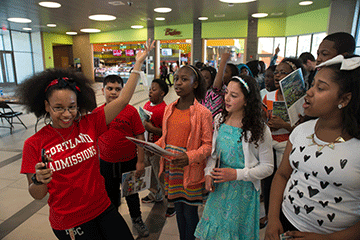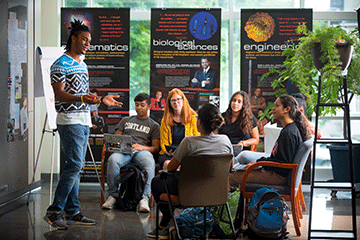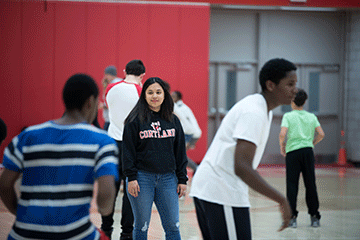
08/31/2021
New York state recently extended and expanded its support for the Cortland’s Urban Recruitment of Educators (C.U.R.E.) program, enabling the program to prepare more teachers to succeed in America’s increasingly diverse classrooms.
Recently, SUNY Cortland administrators of the C.U.R.E. program were notified that the state Education Department approved a second, five-year round of funding at an increased level through a program called My Brother’s Keeper Teacher Opportunity Corps II (TOC).
The university was awarded a total of $194,930 per year from this fall through 2026. The grant total over five years will add up to almost $1 million. The prior TOC award supported 20 C.U.R.E. students a year, and that number will rise to 30.
The C.U.R.E. program has had a record of success in educating teachers from groups underrepresented in teaching, including Black or African American, Latinx, Indigenous and economically disadvantaged backgrounds. Created in 1998, the C.U.R.E. program has prepared 230 future teachers to work in high-needs urban classrooms.
“The profession of teaching has remained overwhelmingly white despite a number of efforts to increase the diversity of the teaching force,” said Anne Burns Thomas, a professor in the Foundations and Social Advocacy Department at SUNY Cortland and coordinator of the C.U.R.E. Program.
“However, the C.U.R.E. program has more than 25 years of experience in removing the obstacles preventing students of color from becoming teachers.”
The C.U.R.E. program presently is underwritten by a mix of private scholarships and foundation and public grants that together with the TOC increase will support an enrollment of 70 students at a time.

C.U.R.E. offers students enrolled in the program a combination of renewable, $4,000 per year tuition support, academic preparation, mentoring and follow-up.
In 2020, C.U.R.E. recruited 14 future teachers, all of whom identified as Latinx, African American, Asian American or multiracial. Students enrolled in any major that leads to teacher certification can benefit from the C.U.R.E. program. The cohort was studying to teach early childhood, childhood, adolescent English, inclusive special education, English as a new language, health, and physical education.
C.U.R.E. graduates are among Cortland’s most accomplished, with several as seniors having earned SUNY Chancellor’s Awards for Student Excellence. Currently enrolled students have maintained a grade point average of 3.31 in 2019 and of 3.59 in 2020. SUNY Cortland’s Dean’s List included 29 of 49 C.U.R.E. students in 2019 and 35 of 54 C.U.R.E. students in 2020. Graduates from the program return to their home communities confident and capable of succeeding in their new profession.
The new round of funding also will help underwrite significant enhancements to C.U.R.E. For example, it will cover a new outreach program aimed at repairing the broken educational pipeline found in many urban schools by encouraging students at the middle school level to consider teaching as a profession.
“One of the things we’re really excited about is that there’s lots of research about the power of having connections between high school students from underrepresented groups who want to become teachers and a college program like C.U.R.E.,” Burns Thomas said.
“With funding received in this grant, we’re actually going to take a step backwards and start in a middle school setting,” Burns Thomas said.
“We’re creating a middle school club for students from underrepresented groups that will be increasing awareness of college options, including teaching,” she said. “So that will include a lot of mentoring by our C.U.R.E. students. We have funding to bring students to campus as soon as everything opens up. We have funding to have guest speakers and do different media projects at the middle school level.”
“But we’re hoping that by starting this club in middle school, we will help them develop their voice in crafting the kind of school experience they would like to have that will help them to achieve their goals in college.”
The C.U.R.E. Program measures the number of qualified students of color admitted to the program, their academic and leadership achievements, retention and graduation rates, and the successful completion of the two-year teaching commitment. That information that was considered in awarding SUNY Cortland the expanded grant.
Brian Barrett, a professor of foundations and social advocacy, serves the university as graduate research coordinator, interviewing and following up with C.U.R.E. students in their first two years of teaching.

He visited and conducted follow-up interviews with 11 C.U.R.E. graduates teaching in Syracuse, Bronx, Manhattan, Ithaca, Niagara Falls, and Lockport, N.Y. During Spring 2020, when SUNY Cortland was forced to send students home as a result of the COVID-19 pandemic, the C.U.R.E. Program staff conducting bi-weekly phone calls with students to discuss difficulties and connect students with resources.
“One of the most common comments was that they felt prepared right upon graduation and were leading conversations with their more experienced colleagues about important issues such as culturally responsive teaching,” Burns Thomas noted. “They felt very well prepared by C.U.R.E. to be in any kind of teaching situation including one that others might find very challenging.”
Before 2017, the C.U.R.E. program had managed for a decade without significant state funding after the Great Recession of 2007 swept away similar state resources. What kept the program afloat was the university’s own commitment to C.U.R.E., supported by numerous individual donors. They included many alumni as well as two ongoing institutional benefactors, the Park Foundation and the National Grid Foundation.
“I guess I would also say that SUNY Cortland is a model for how to support a program like this, both in terms of institutional support for the programming and the ways in which the Division of Institutional Advancement has helped to increase private funds,” Burns Thomas said.
For example, for the life of the C.U.R.E. program, her own position as part-time faculty member as well as part-time program administrator is supported by SUNY Cortland.
“That’s unique and that’s one of the reasons why we serve as a model,” Burns Thomas said. “There’s consistent funding. So we are able to use our funding to be more, I think, very student focused.”
The first round of TOC money served to reimagine mentoring to include student pairings with practicing K-12 educators who are themselves members of underrepresented groups, with teacher-mentors from diverse cultural or ethnic backgrounds recruited from districts in Binghamton, Ithaca and Syracuse. Mentors met the C.U.R.E. student in groups and advise them individually.
“I think the value of the C.U.R.E. program is to provide a visible commitment to increasing the diversity of the teaching force,” Burns Thomas said. “Through our innovative programming and the way in which we’re able to leverage opportunities for the whole university, the C.U.R.E. program makes the case that we need more diverse teachers in order to have a successful school system.”